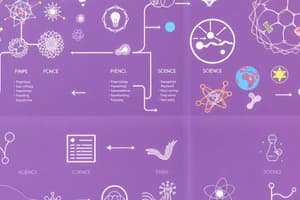Podcast
Questions and Answers
Which branch of science focuses specifically on the study of living organisms?
Which branch of science focuses specifically on the study of living organisms?
- Biology (correct)
- Mathematics
- Physics
- Chemistry
What is the first step in the scientific method?
What is the first step in the scientific method?
- Conclusion
- Experiment
- Observation (correct)
- Hypothesis
Which of the following best describes the primary focus of natural sciences?
Which of the following best describes the primary focus of natural sciences?
- Study of human behavior and society
- Study of formal systems and logic
- Study of economic systems
- Study of natural phenomena (correct)
What type of science combines biology and psychology to study the mind and behavior?
What type of science combines biology and psychology to study the mind and behavior?
Which of the following illustrates a key ethical issue in scientific research?
Which of the following illustrates a key ethical issue in scientific research?
Why is communication an essential step in the scientific method?
Why is communication an essential step in the scientific method?
What significant advancements are currently being researched in science?
What significant advancements are currently being researched in science?
Which branch of science specializes in the study of matter and energy?
Which branch of science specializes in the study of matter and energy?
Flashcards are hidden until you start studying
Study Notes
Science Overview
- Definition: Systematic study of the structure and behavior of the physical and natural world through observation and experimentation.
Key Branches of Science
-
Natural Sciences: Study of natural phenomena.
- Physics: Study of matter, energy, and the fundamental forces of nature.
- Chemistry: Study of substances, their properties, reactions, and formation.
- Biology: Study of living organisms and their interactions with the environment.
-
Formal Sciences: Study of formal systems and logic.
- Mathematics: The abstract science of number, quantity, and space.
- Computer Science: Study of algorithms, data structures, and computational systems.
-
Social Sciences: Study of societies and relationships among individuals.
- Psychology: Study of mind and behavior.
- Sociology: Study of social behavior and society.
- Economics: Study of production, distribution, and consumption of goods and services.
Scientific Method
- Steps:
- Observation: Gathering data through senses.
- Question: Formulating a question based on observations.
- Hypothesis: Proposing a testable explanation.
- Experiment: Designing and conducting experiments to test the hypothesis.
- Analysis: Evaluating the data collected.
- Conclusion: Drawing conclusions from the analysis.
- Communication: Sharing results for peer review.
Importance of Science
- Advancements: Leads to technological innovations and medical breakthroughs.
- Understanding: Helps in understanding natural phenomena and solving complex problems.
- Informed Decisions: Provides a basis for making informed decisions in policy and governance.
Interdisciplinary Nature
- Many fields combine elements from different scientific disciplines, e.g., Biochemistry (Biology + Chemistry), Environmental Science (Biology + Earth Sciences), and Neuroscience (Biology + Psychology).
Ethics in Science
- Importance of integrity, transparency, and accountability in research.
- Issues such as plagiarism, data fabrication, and ethical treatment of human and animal subjects.
Current Trends in Science
- Climate Change Research: Addressing global warming and environmental issues.
- Genomic Medicine: Personalizing healthcare based on genetic information.
- Artificial Intelligence: Developing algorithms and systems that simulate human intelligence.
Science Definition
- Systematic study of the physical and natural world through observation and experimentation.
### Key Branches of Science
- Natural Sciences: Study the natural world.
- Physics: Studies matter, energy, and the fundamental forces of nature.
- Chemistry: Studies substances, their properties, reactions, and formation.
- Biology: Studies living organisms and their interactions with the environment.
- Formal Sciences: Study formal systems and logic.
- Mathematics: The abstract science of number, quantity, and space.
- Computer Science: Studies algorithms, data structures, and computational systems.
- Social Sciences: Studies societies and relationships among individuals.
- Psychology: Studies the mind and behavior.
- Sociology: Studies social behavior and society.
- Economics: Studies the production, distribution, and consumption of goods and services.
Scientific Method
- Steps:
- Observation: Gathering data through senses.
- Question: Formulating a question based on observations.
- Hypothesis: Proposing a testable explanation.
- Experiment: Designing and conducting experiments to test the hypothesis.
- Analysis: Evaluating the data collected.
- Conclusion: Drawing conclusions from the analysis.
- Communication: Sharing results for peer review.
Importance of Science
- Advancements: Leads to technological innovations and medical breakthroughs.
- Understanding: Helps in understanding natural phenomena and solving complex problems.
- Informed Decisions: Provides a basis for making informed decisions in policy and governance.
Interdisciplinary Nature
- Some scientific fields combine elements from different scientific disciplines, for example:
- Biochemistry: combines biology and chemistry
- Environmental Science: combines biology and earth sciences
- Neuroscience: combines biology and psychology
Ethics in Science
- Importance of integrity, transparency, and accountability in research.
- Issues such as plagiarism, data fabrication, and ethical treatment of human and animal subjects.
### Current Trends in Science
- Climate Change Research: Addressing global warming and environmental issues.
- Genomic Medicine: Personalizing healthcare based on genetic information.
- Artificial Intelligence: Developing algorithms and systems that simulate human intelligence.
Studying That Suits You
Use AI to generate personalized quizzes and flashcards to suit your learning preferences.




